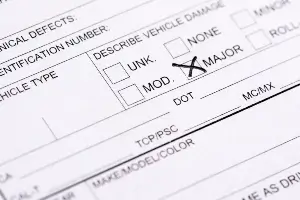 After a car accident in South Bend, the police report feels like your strongest proof of what happened. Afterall, you saw the officer measure skid marks, photograph vehicle damage, and interview the other driver, yourself, and witnesses. That report documents everything, so it should support your case, right? The reality is more complex. Indiana courts do allow police reports as evidence, but understanding how they are used can make or break your injury claim.
After a car accident in South Bend, the police report feels like your strongest proof of what happened. Afterall, you saw the officer measure skid marks, photograph vehicle damage, and interview the other driver, yourself, and witnesses. That report documents everything, so it should support your case, right? The reality is more complex. Indiana courts do allow police reports as evidence, but understanding how they are used can make or break your injury claim.
Pfeifer, Morgan & Stesiak has helped countless crash victims in Indiana navigate the evidence-gathering process after being injured by another driver’s negligence.
Our knowledgeable attorneys understand exactly how police reports strengthen your claim and when you may need additional evidence. We are also very familiar with how insurance companies try to twist report language to minimize your claim and deny fair compensation. But our trusted car accident lawyers in South Bend is always prepared to fight back for our clients.
Call Our South Bend Law Firm today for a free consultation. (574) 444-0741
Can Police Reports Be Used as Evidence in an Indiana Personal Injury Cases?
Police reports are not typically admissible as direct evidence in Indiana court trials due to hearsay rules. But they are still critical to your claim, especially if it ends up in court. The report itself is a summary document created after the crash, and not live testimony. However, the information documented within that report can be referenced as critical evidence when presented through proper legal channels.
Here’s how police report information enters your case:
- Officer Testimony: The responding officer can testify in court about their direct observations—vehicle positions, skid marks, road conditions, visible injuries, and damage they personally witnessed.
- Photographs and Diagrams: Images taken by officers can be authenticated and submitted as separate evidence showing crash scene conditions and vehicle damage.
- Witness Information: Contact details in the report help attorneys locate and interview witnesses who can provide their own testimony about what happened.
- Citations and Violations: Traffic tickets issued at the scene serve as public records that can be introduced to establish fault or negligent behavior.
- Physical Measurements: Documented measurements of skid marks, debris fields, and vehicle positions support accident reconstruction when testified to by the officer.
Most Indiana personal injury cases settle before reaching trial. During settlement negotiations, insurance adjusters review police reports closely when evaluating liability and determining offers, even though courtroom admissibility rules don’t apply at that stage.
What Information in my Police Report Could Help My South Bend Car Accident Claim?
Your police report contains specific details that directly impact how insurance companies evaluate your claim. Understanding which elements carry the most weight helps you recognize the strength of your case. Some information proves fault clearly, while other details support your injury claims and damage calculations.
Key report elements that strengthen South Bend accident claims:
- Fault Determination: The officer’s conclusion about who caused the crash influences how insurance adjusters assign liability percentages.
- Citations Issued: Traffic tickets given at the scene document specific violations like running red lights, speeding, or following too closely.
- Weather and Road Conditions: Documented rain, ice, poor visibility, or road defects explain contributing factors and may shift liability.
- Vehicle Damage Descriptions: Detailed notes about impact points, severity, and which parts were damaged help establish crash force and injury causation.
- Injury Documentation: Officers note visible injuries, complaints of pain, and whether ambulances transported victims—creating an immediate injury record.
- Witness Contact Information: Names and phone numbers of bystanders who saw the crash provide independent accounts supporting your version of events.
- Diagrams and Photos: Visual documentation of vehicle positions, skid marks, and debris patterns shows exactly how the collision occurred.
Is a Police Report Still Helpful If I Am Partially at Fault for My Car Crash?
Yes, a police report remains valuable even when you share some responsibility for the accident. Indiana’s comparative fault law allows you to recover damages as long as you’re less than 51 percent at fault. The report documents the full circumstances of the crash—not just who made mistakes, but also road conditions, visibility issues, and the other driver’s actions. This complete picture often reveals that while you may have contributed to the accident, the other driver bears greater responsibility.
Police reports that show you may have contributed to your car accident don’t automatically doom your claim. Insurance adjusters start with the officer’s assessment, but experienced attorneys can challenge inaccurate fault percentages using additional evidence. Witness statements, traffic camera footage, and other clear evidence can significantly help to shift fault percentages.
But even if you were 20 percent responsible, it’s important to remember you can still recover 80 percent of your damages in Indiana. Your claim is still worth pursuing in this situation, especially if you are being represented by a knowledgeable legal team.
What If I Find a Mistake in My South Bend Police Report?
Errors in police reports happen more often than you might expect. In fact, this is a key reason why you should get a copy of your report and look it over as soon as possible. Officers arrive at chaotic crash scenes, interview stressed drivers, and complete reports under time pressure. Sometimes they may misunderstand what happened, record wrong vehicle positions, or misinterpret a driver’s statement.
While these are understandable human errors, these mistakes can seriously damage your injury claim if left uncorrected. There are two types of errors you might find on your police report:
Factual Errors
Factual errors involve incorrect objective information like wrong driver names, inaccurate vehicle descriptions or mistaken addresses. Additional examples include wrong insurance policy numbers or transposed license plate digits. While these errors may seem minor, they can delay your claim or create confusion about which policy provides coverage.
Opinion-Based Errors
Opinion-based errors involve the officer’s conclusions about how the crash happened or who caused it. The officer may have incorrectly determined fault or drawn wrong conclusions from the evidence. These subjective assessments carry significant weight with insurance adjusters, though, despite the fact the officer didn’t witness the actual collision.
These types of errors are harder to resolve, but not impossible. You can request amendments to police reports through the South Bend Police Department. But check on the process as it varies depending on the type of error you found and current departmental policies.
Factual corrections are generally easier to make since you can just provide documents that backup your findings. For an opinion-based error, your attorney can supplement the original report with independent evidence that contradicts the inaccurate conclusion made by the officer. Supportive evidence of your claim may include affidavits, photographs, video footage, and expert analysis.
How Soon After My Car Accident Can I Get My South Bend Police Reports?
South Bend police reports are typically available within 3 to 10 business days after your accident. You can request your report from the South Bend Police Department directly. by providing the crash date, location, and driver information. Some departments offer online request systems while others require in-person or mail requests with a small processing fee.
Getting your report quickly matters for a couple of reasons. First, you can more quickly spot mistakes and get them corrected. Second, it helps your attorney to be able to start building your case immediately. They can contact witnesses while their memories about what happened are still fresh, and respond to insurance companies before they try to offer you a lowball settlement that is based on incomplete information.
How Insurance Companies Use Your Car Crash Police Report to Minimize Your Claim
Insurance adjusters obtain police reports within days of your accident and use them as their primary tool for reducing what they pay you. They’re trained to find any detail—no matter how minor—that shifts blame toward you or questions the severity of your injuries. Understanding their tactics helps you avoid saying or doing things that strengthen their arguments against fair compensation.
Common ways adjusters may try to exploit police reports:
- Using Your Statements Against You: Any comment you made at the scene suggesting partial fault, such as, “I didn’t see them” or “maybe I was distracted,” can be used against you to reduce your settlement.
- Minimizing Your Injuries: If the report doesn’t mention visible injuries or ambulance transport, adjusters argue your injuries aren’t serious despite later medical diagnoses.
- Questioning Fault Determinations: When reports show both parties were to blame – or even unclear liability, adjusters will use this ambiguity to minimize a claim or even fully deny liability.
- Emphasizing Pre-Existing Damage: Notes about prior vehicle damage become “proof” that crash damage wasn’t as severe as you claim.
- Using Delayed Medical Treatment: Reports showing you refused ambulance transport or didn’t complain of pain at the scene suggest injuries weren’t crash-related.
- Focusing on Minor Violations: Your small traffic mistake documented in the report—like an expired registration—gets blown out of proportion to shift fault percentages.
Pfeifer, Morgan & Stesiak Use Police Reports to Maximize Your Indiana Car Crash Settlement
Our knowledgeable attorneys immediately obtain your police report and identify every piece of evidence that strengthens your claim. We challenge inaccurate fault determinations by gathering contradictory evidence—witness statements, surveillance footage, cell phone records, and accident reconstruction analysis. We use the report’s documented violations, injury observations, and scene conditions to build compelling arguments that insurance companies can’t easily dismiss. When reports contain errors or incomplete information, we supplement them with independent evidence that tells the complete story of what happened.
Don’t let insurance companies use your police report against you. The experienced legal team at Pfeifer, Morgan & Stesiak knows exactly how to counter adjuster tactics and fight for the full compensation you deserve after a South Bend car accident. There are no upfront costs or fees to worry about. We only get paid if you do, and we manage everything while you focus on getting better.
Your police report is just one piece of your case—let us build the rest. (574) 444-0741




